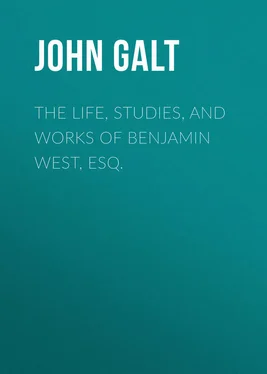John Galt - The Life, Studies, and Works of Benjamin West, Esq.
Здесь есть возможность читать онлайн «John Galt - The Life, Studies, and Works of Benjamin West, Esq.» — ознакомительный отрывок электронной книги совершенно бесплатно, а после прочтения отрывка купить полную версию. В некоторых случаях можно слушать аудио, скачать через торрент в формате fb2 и присутствует краткое содержание. Жанр: foreign_antique, foreign_prose, на английском языке. Описание произведения, (предисловие) а так же отзывы посетителей доступны на портале библиотеки ЛибКат.
- Название:The Life, Studies, and Works of Benjamin West, Esq.
- Автор:
- Жанр:
- Год:неизвестен
- ISBN:нет данных
- Рейтинг книги:5 / 5. Голосов: 1
-
Избранное:Добавить в избранное
- Отзывы:
-
Ваша оценка:
- 100
- 1
- 2
- 3
- 4
- 5
The Life, Studies, and Works of Benjamin West, Esq.: краткое содержание, описание и аннотация
Предлагаем к чтению аннотацию, описание, краткое содержание или предисловие (зависит от того, что написал сам автор книги «The Life, Studies, and Works of Benjamin West, Esq.»). Если вы не нашли необходимую информацию о книге — напишите в комментариях, мы постараемся отыскать её.
The Life, Studies, and Works of Benjamin West, Esq. — читать онлайн ознакомительный отрывок
Ниже представлен текст книги, разбитый по страницам. Система сохранения места последней прочитанной страницы, позволяет с удобством читать онлайн бесплатно книгу «The Life, Studies, and Works of Benjamin West, Esq.», без необходимости каждый раз заново искать на чём Вы остановились. Поставьте закладку, и сможете в любой момент перейти на страницу, на которой закончили чтение.
Интервал:
Закладка:
In point of composition, Mr. West is of opinion that the Trial of Susannah was superior to the Death of Socrates. In this he is probably correct; for during the interval between the execution of the one and the other, his mind had been enlarged in knowledge by reading, his eye improved by the study of pictorial outline and perspective in the Camera , and his touch softened by the portraits which he painted, and particularly by his careful copy of the St. Ignatius. In point of drawing, both pictures were no doubt greatly inferior to many of his subsequent works; but his son, long after he had acquired much celebrity, saw the picture of the Death of Socrates; and was of opinion that it was not surpassed by any of them in variety of composition, and in that perspicuity of narrative which is the grand characteristic of the Artist's genius.
Chap. V
Motives which induced him to visit New York. – State of Society in New York. – Reflections on the sterility of American talent. – Considerations on the circumstances which tend to produce Poetical feelings. – The causes which produced the peculiarities in the state of Society in New York. – The Accident which led the Artist to discover the method of colouring Candle-light and Fire effects after Nature. – He copies Strange's engraving of Belisarius, by Salvador Rosa. – The occurrence which hastened his Voyage to Italy, with the Anecdote of his obligations to Mr. Kelly. – Reflections on Plutarch, occasioned by reference to the effect which his works had on the mind of West. – The Artist embarks; occurrence at Gibraltar. – He arrives at Leghorn. – Journey to Rome.
But although West found himself in possession of abundant employment in Philadelphia, he was sensible that he could not expect to increase his prices with effect, if he continued constantly in the same place. He also became sensible that to view life in various lights was as necessary to his improvement as to exercise his pencil on different subjects. And, beyond all, he was profoundly sensible, by this time, that he could not hope to attain eminence in his profession, without inspecting the great master-pieces of art in Europe, and comparing them with his own works in order to ascertain the extent of his powers. This philosophical view of his situation was doubtless partly owing to the excellent precepts of Provost Smith, but mainly to his own just perception of what was necessary to the successful career of an Artist: indeed the principle upon which the notion was formed is universal, and applies to all intellectual pursuits. Accordingly, impressed with these considerations, he frugally treasured the earnings of his pencil, that he might undertake, in the first place, a professional journey from Philadelphia, as preparatory to acquiring the means of afterwards visiting Europe, and particularly Rome. When he found that the state of his funds enabled him to undertake the journey, he went to New York.
The Society of New York was much less intelligent in matters of taste and knowledge than that of Philadelphia. In the latter city the institutions of the college and library, and the strict moral and political respectability of the first settlers, had contributed to form a community, which, though inferior in the elegancies of living, and the etiquettes of intercourse, to what is commonly found in the European capitals, was little behind them in point of practical and historical information. Dr. Smith, the Provost of the college, had largely contributed to elevate the taste, the sentiment and the topics of conversation in Philadelphia. He was full of the best spirit of antiquity, and there was a classical purity of mind and splendour of imagination sometimes met with in the families which he frequented, that would have done honour to the best periods of polished society.
It would be difficult to assign any reason why it has so happened that no literary author of any general celebrity, with the exception of Franklin, has yet arisen in America. That men of learning and extensive reading, capable of vying with the same description of persons in Europe, are to be found in the United States, particularly in Philadelphia, is not to be denied; but of that class, whose talents tend to augment the stock of intellectual enjoyment in the world, no one, with the single exception already alluded to, has yet appeared.
Poetry is the art of connecting ideas of sensible objects with moral sentiments; and without the previous existence of local feelings, there can be no poetry. America to the first European settlers had no objects interesting to the imagination, at least of the description thus strictly considered as poetical; for although the vigour and stupendous appearances of Nature were calculated to fill the mind with awe, and to exalt the contemplations of enthusiasm, there was nothing connected with the circumstances of the scene susceptible of that colouring from the memory, which gives to the ideas of local resemblance the peculiar qualities of poetry. The forests, though interminable, were but composed of trees; the mountains and rivers, though on a larger scale, were not associated in the mind with the exertions of patriotic valour, and the achievements of individual enterprize, like the Alps or the Danube, the Grampians or the Tweed. It is impossible to tread the depopulated and exhausted soil of Greece without meeting with innumerable relics and objects, which, like magical talismans, call up the genius of departed ages with the long-enriched roll of those great transactions, that, in their moral effect, have raised the nature of man, occasioning trains of reflection which want only the rythm of language to be poetry. But in the unstoried solitudes of America, the traveller meets with nothing to awaken the sympathy of his recollective feelings. Even the very character of the trees, though interesting to scientific research, chills, beneath the spaciousness of their shade, every poetical disposition. They bear little resemblance to those which the stranger has left behind in his native country. To the descendants of the first settlers, they wanted even the charm of those accidental associations which their appearance might have recalled to the minds of their fathers. Poetry is, doubtless, the first of the intellectual arts which mankind cultivate. In its earliest form it is the mode of expressing affection and admiration; but, before it can be invented, there must be objects beloved and admired, associated with things in nature endowed with a local habitation and a name. In America, therefore, although there has been no lack of clever versifiers, nor of men who have respectably echoed the ideas current in the old world, the country has produced nothing of any value descriptive of the peculiar associations connected with its scenery. Among some of the Indian tribes a vein of original poetry has, indeed, been discovered; but the riches of the mine are unexplored, and the charge of sterility of fancy, which is made by the Europeans against the citizens of the United States, still remains unrefuted. Since the period, however, to which these memoirs chiefly refer, events of great importance have occurred, and the recollections connected with them, no doubt, tend to imbue the American climate with the elements of poetical thought; but they are of too recent occurrence for the purposes either of the epic or the tragic muse. The facts of history in America are still seen too much in detail for the imagination to combine them with her own creation. The fields of battle are almost too fresh for the farmer to break the surface; and years must elapse before the ploughshare shall turn up those eroded arms of which the sight will call into poetical existence the sad and dreadful incidents of the civil war.
In New York Mr. West found the society wholly devoted to mercantile pursuits. A disposition to estimate the value of things, not by their utility, or by their beauty, but by the price which they would bring in the market, almost universally prevailed. Mercantile men are habituated by the nature of their transactions to overlook the intrinsic qualities of the very commodities in which they deal; and though of all the community they are the most liberal and the most munificent, they set the least value on intellectual productions. The population of New York was formed of adventurers from all parts of Europe, who had come thither for the express purpose of making money, in order, afterwards, to appear with distinction at home. Although West, therefore, found in that city much employment in taking likenesses destined to be transmitted to relations and friends, he met with but few in whom he found any disposition congenial to his own; and the eleven months which he passed there, in consequence, contributed less to the improvement of his mind than might have been expected from a city so flourishing. Still, the time was not altogether barren of occurrences which tended to advance his progress in his art, independent of the advantage arising from constant practice.
Читать дальшеИнтервал:
Закладка:
Похожие книги на «The Life, Studies, and Works of Benjamin West, Esq.»
Представляем Вашему вниманию похожие книги на «The Life, Studies, and Works of Benjamin West, Esq.» списком для выбора. Мы отобрали схожую по названию и смыслу литературу в надежде предоставить читателям больше вариантов отыскать новые, интересные, ещё непрочитанные произведения.
Обсуждение, отзывы о книге «The Life, Studies, and Works of Benjamin West, Esq.» и просто собственные мнения читателей. Оставьте ваши комментарии, напишите, что Вы думаете о произведении, его смысле или главных героях. Укажите что конкретно понравилось, а что нет, и почему Вы так считаете.



![Brian Thompson - A Monkey Among Crocodiles - The Life, Loves and Lawsuits of Mrs Georgina Weldon – a disastrous Victorian [Text only]](/books/704922/brian-thompson-a-monkey-among-crocodiles-the-life-thumb.webp)








